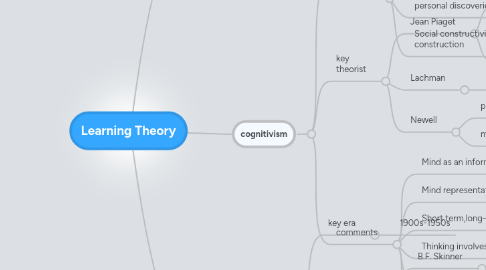
1. cognitivism
1.1. key era
1.1.1. 1960s-1970s
1.2. key theorist
1.2.1. Jean Piaget
1.2.1.1. cognitive child development
1.2.1.2. detailed observational studies of cognition in children
1.2.1.3. a series of tests to reveal different cognitive abilities
1.2.2. Lachman
1.2.2.1. cognitive revolution
1.2.3. Newell
1.2.3.1. perception
1.2.3.2. motor control
1.3. comments
1.3.1. Mind as an information processor
1.3.2. Mind representations and mental models
1.3.3. Short term,long-term and working memory
1.3.4. Thinking involves manipulation of representations
1.3.5. Transfer of knowledge through cognitive strategies
1.3.6. Students remember rules,patterns and strategies
2. behaviorism
2.1. key era
2.1.1. 1900s-1950s
2.2. key theorist
2.2.1. B.F. Skinner
2.2.1.1. a complex interaction extending across multiple temporal scales involving organisms and the environment
2.2.2. Edward Thorndike
2.2.2.1. apply psychological principles to the area of learning. the transition from the school of functionalism to behaviorism the transition from the school of functionalism to behaviorism
2.2.3. Clark L. Hull
2.2.3.1. a forerunner of the behavioural study of hypnosis the reality of some classical phenomena such as mentally induced pain reduction and apparent inhibition of memory recall.
2.3. comments
2.3.1. Stimulus&Response
2.3.2. Mind as a black box
2.3.3. Mind processes not important
2.3.4. Focus on observable cause and effect relationship
2.3.5. Student remebr and respond
2.3.6. Teacher present and provide practice and feedabck
3. constructivism
3.1. key era
3.1.1. 1980s-1990s
3.2. key theorist
3.2.1. Lev Vygotsky (1896-1934)
3.2.1.1. learning is a necessary and universal aspect of the process of developing culturally organized, specifically human psychological function
3.2.2. Jean Piaget
3.2.2.1. adaptation
3.2.2.1.1. Assimilation
3.2.2.1.2. accommodation
3.2.2.2. organization
3.2.2.2.1. complex
3.2.2.2.2. integrated
3.3. comments
3.3.1. Knowledge us constructed through assimilation and accommodation
3.3.2. Knowledge is inseparable from knower
3.3.3. Learning is active process that involves personal discoveries
3.3.4. Social constructivism evolved from cognitive construction
